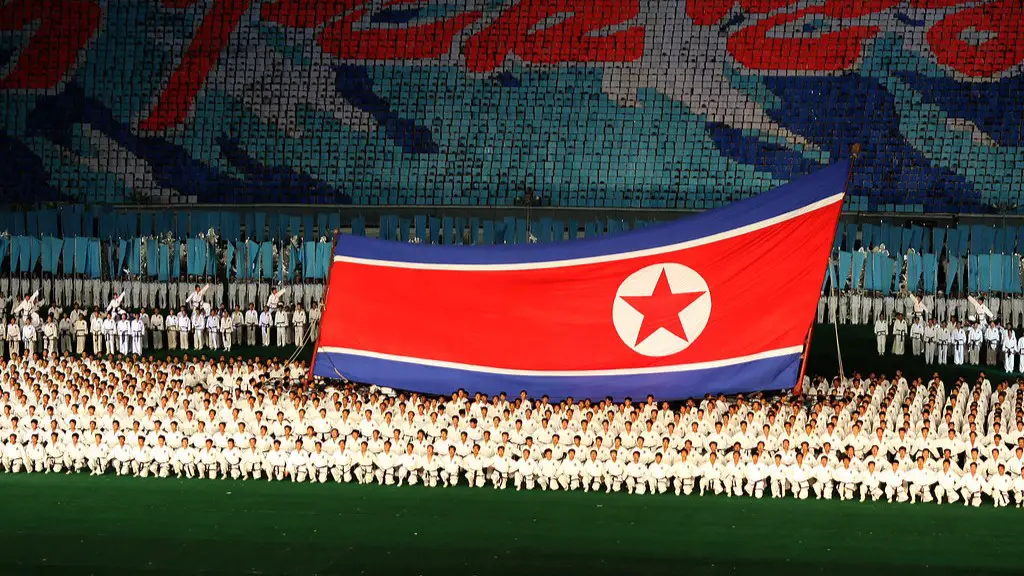Reasons Behind North Korea’s Aggression
North Korea’s military aggression toward the United States has raised concern for many Americans. While North Korean leader Kim Jong Un has stated his goal of reunifying the Korean Peninsula, his pursuit of nuclear weapons, as well as recent missile launches and his bellicose rhetoric, appear to contradict his stated goal. To better understand why North Korea would consider attacking the United States, it is important to understand their underlying motivations.
One of the key reasons for North Korea’s aggression is the belief that nuclear weapons are essential for national security. North Korea has long sought to minimize the threat posed by the United States by pursuing a policy of nuclear deterrence. This has been stated publicly by North Korean officials, suggesting a desire to prevent the United States from carrying out an attack. North Korea has also indicated that its development of nuclear weapons is motivated by fear of a US invasion, as well as its acquisition of a nuclear capability to counter the US military presence in South Korea, Japan and beyond.
Further, North Korea’s aggressive posturing may be motivated by a desire to gain international attention. North Korea has used its military capabilities as a tool to draw attention away from its dismal human rights record and the impact of sanctions. This may be driving North Korea’s decision to carry out provocative missile tests and to engage in verbal provocations against the United States and its allies.
The leadership in North Korea may also be motivated by a desire to reassert its national sovereignty. Kim Jong Un has consistently emphasized his vision for an independent and sovereign North Korea, and this may explain the drive to acquire a nuclear capability, as well as its confrontational stance toward the United States and its allies.
Finally, North Korea may be motivated by a desire to gain economic benefits, as it is believed that Kim Jong Un has been pursuing a policy of rapprochement with China in order to gain access to its economic advantages. North Korea’s recent pursuit of nuclear weapons and missile tests may be related to this goal, as a nuclear capable North Korea may be seen as a bargaining chip in negotiations with the United States and other countries.
The Effects of North Korea’s Actions
It is clear that North Korea’s pursuit of a nuclear arsenal and its aggressive rhetoric pose a direct threat to the United States and its allies. North Korea has carried out numerous tests and launches of ballistic missiles, as well as a series of provocative statements, which have heightened tensions and led to a greater risk of conflict.
Moreover, North Korea’s actions have had a damaging economic impact, as economic sanctions have been imposed by the United States and other countries in response to its nuclear activities. These sanctions have had a significant impact on the already fragile North Korean economy, potentially leading to further hardship for the country’s citizens.
Internationally, North Korea’s actions have also undermined global stability, as the threat of conflict stemming from its nuclear capabilities has the potential to draw in other powers and destabilize the region. In addition, North Korea’s provocative behavior and its refusal to cooperate with international efforts to contain its nuclear ambitions have resulted in a heightened risk of instability in the wider region.
The US Response To North Korea
In response to North Korea’s nuclear weapons pursuits and aggressions, the United States has sought to contain the threat by imposing sanctions on North Korean entities, as well as placing North Korea on the US list of state sponsors of terrorism.
In addition, the United States has led a diplomatic effort to persuade North Korea to denuclearize and re-engage in negotiations. This diplomatic effort has been met with limited success, as North Korea has been unwilling to come to the negotiating table.
The United States has also sought to bolster its military presence in the region and to strengthen its security alliances with South Korea and Japan. It is believed that this may be aimed at deterring North Korean aggression, as well as signaling to North Korea that any attack on the United States or its allies will meet with an appropriate and swift response.
US Options For Resolving The Issue
Given the increasing threat posed by North Korea, it is important for the United States to consider its options for resolving the issue. One option may lie in a diplomatic resolution, with the United States and its allies working with China and other regional powers to engage in talks with North Korea. This option may also involve economic incentives to persuade North Korea to denuclearize and re-engage in negotiations.
Alternatively, the United States could increase its military presence in the region and take a more confrontational approach towards North Korea. This may involve strengthening military alliances in the region and taking a more aggressive stance in deterring North Korean aggression. This approach, however, carries with it the risk of inciting conflict and further destabilizing the region.
Expert Perspectives On North Korea’s Intentions
Experts are divided on North Korea’s ultimate intentions, with some arguing that Kim Jong Un is simply engaging in brinkmanship to gain the upper hand in negotiations, while others believe that North Korea is intent on attacking the United States and its allies.
Experts at the Center for Strategic and International Studies suggest that while North Korea’s nuclear program poses a direct threat to the US and its allies, it is unlikely that North Korea is seeking to launch an all-out attack on the United States. They argue that North Korea’s nuclear capability is intended to serve as a deterrent against a US invasion and is not meant to be used offensively.
In contrast, other experts have argued that North Korea’s nuclear program is a direct threat to the United States and its allies, and suggest that the country is pursuing a policy of aggression. These experts point to North Korea’s frequent missile tests, its disregard for international sanctions, as well as its rhetorical provocations, as proof that it is intent on attacking the United States and its allies.
Key Takeaways
It is clear that North Korea’s aggressive posturing and its pursuit of a nuclear arsenal pose a threat to the United States and its allies. North Korea’s motivations may include a desire to gain international attention, reassert its national sovereignty, and secure economic benefits.
In response to this threat, the United States has sought to impose economic sanctions on North Korea, as well as engage in diplomatic efforts, bolster alliances in the region, and increase its military presence. However, experts are divided on North Korea’s ultimate intentions, with some arguing that Kim Jong Un is simply engaging in brinkmanship, while others believe that North Korea is intent on attacking the United States and its allies.
Implications For The US
The threat posed by North Korea to the United States and its allies has clear implications for the US. To address this threat, the US must develop an effective strategy to contain North Korea’s nuclear capability and to prevent it from developing further.
To this end, the United States must consider all diplomatic, economic and military options when engaging with North Korea. Countries may gain a better understanding of North Korea’s intentions by exploring North Korea’s underlying motivations and engaging in dialogue with North Korean officials.
The United States should also work with regional partners, such as China and South Korea, to develop a regional strategy to contain North Korea’s nuclear program and stabilize the region. This approach must be complemented by increased economic sanctions, as well as increased military presence in the region.
Potential Role For The UN
The United Nations may potentially play a role in addressing the conflict between North Korea and the United States. The UN has the ability to act as an intermediary between the two countries, as well as to carry out inspections and verification of North Korea’s nuclear activities. This may potentially lead to a diplomatic resolution of the conflict and the eventual denuclearization of the Korean Peninsula.
The United Nations has also recently presented a potential framework for a diplomatic solution to the conflict, which includes a cease fire agreement between North Korea and the United States, as well as diplomatic dialogue between the two countries. This framework may provide a basis for a negotiated settlement of the conflict and could potentially lead to the eventual denuclearization of the Korean Peninsula.
Potential Impact Of Sanctions On North Korea
One of the key responses to North Korea’s nuclear ambitions has been the imposition of economic sanctions by the United States and other countries. These sanctions have had a significant impact on the North Korean economy and have resulted in further economic hardship for its citizens.
In addition, the sanctions have served to isolate North Korea from the international community and have limited its access to foreign markets. This has had a damaging effect on North Korea’s economy and has restricted its ability to develop and modernize its infrastructure and industrial base.
The sanctions have also had a detrimental effect on North Korea’s political system, as the regime has become increasingly reliant on foreign aid and investment to sustain its economy. This has further undermined the Kim Jong Un regime and has limited the country’s ability to pursue its aggressive foreign policy objectives.
The Significance Of North Korea’s Nuclear Program
North Korea’s nuclear program has significant implications for international security and stability. North Korea’s pursuit of a nuclear capability has led to increased regional tensions and a greater risk of conflict between the United States and its allies and North Korea.
In addition, the development of a nuclear arsenal has emboldened North Korea and its leader, Kim Jong Un, to engage in more aggressive posturing and provocations. This has had a destabilizing effect on the region and has led to a heightened risk of conflict and war.
Finally, North Korea’s nuclear program has also led to an increased risk of proliferation, as other countries in the region may be motivated to pursue nuclear weapons in response to North Korea’s possession of a nuclear arsenal. This could potentially lead to an arms race in the region, which would pose an even greater threat to regional and global stability.


